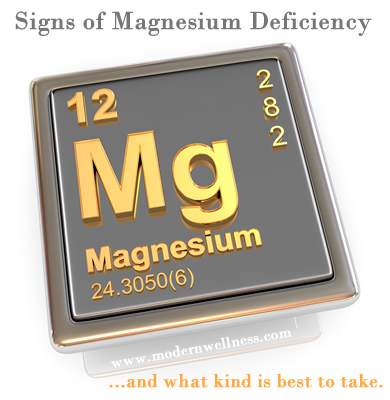Magnesium Deficiency and What Kind Is Best To Take?

I have been fighting extreme exhaustion for at least 7 months and before that just an overall tired feeling for several years. Some days have been so bad that I would get up in the morning, shower and get ready for my day and have to lay down. I needed a nap almost everyday, which was fine when my toddler was taking naps and then he stopped about a month ago and I felt a little panicked. One chiropractor told me that my adrenals were shot, one told me that my neck placement could be affecting everything in my body, a reflexology lady also told me that my adrenals and thyroid were drained and that I needed magnesium and iodine, and a chiro that is also a nutritionist agreed with all the above and ordered blood work.
My husband being the genius that he is when it comes to nutrition and research started looking into thyroid, and adrenals, and the pituitary gland (which controls both of the previous two). It led him to look extensively at magnesium and what it means to be magnesium deficient. Here is a list of some of the symptoms he found:
SIGNS OF MAGNESIUM DEFICIENCY
(the brief list)
 Irritability and anxiety
Irritability and anxiety- Lethargy
- Impaired memory and cognitive function
- Anorexia or loss of appetite
- Weakness
- Muscle spasms
- Vertigo
- Irregular or rapid heartbeat
It is estimated that between 68 to 80 percent of the United States population is magnesium deficient. So it isn’t too far of a stretch to think that this is the reason why I’ve been feeling the above symptoms for the past several months.
TOP 10 FOODS THAT CONTAIN MAGNESIUM
There are several foods that contain this essential mineral naturally. The downside is that the soil used to grow these foods is so depleted of this mineral that we are not getting nearly enough magnesium from our diets. If you want to include the following foods it certainly wouldn’t hurt though!
 Kale
Kale- Spinach
- Swiss Chard
- Pumpkin Seeds
- Sesame Seeds
- Cashews
- Quinoa
- Avocados
- Bananas
- Brown Rice
THE BEST FORMS OF MAGNESIUM
- Magnesium glycinate is a chelated form of magnesium that tends to provide the highest levels of absorption and bioavailability and is typically considered ideal for those who are trying to correct a deficiency.
- Magnesium malate is a fantastic choice for people suffering from fatigue, since malic acid — a natural fruit acid present in most cells in the body — is a vital component of enzymes that play a key role in ATP synthesis and energy production. Since the ionic bonds of magnesium and malic acid are easily broken, magnesium malate is also highly soluble.
- Magnesium citrate is the most popular magnesium supplement, probably because it is inexpensive and easily absorbed. Since citric acid is a mild laxative, magnesium citrate functions as a constipation aid as well as a magnesium source. It is a great choice for individuals with rectal or colon problems but is unsuitable for those with loose bowel movements.
- Magnesium taurate is the best choice of magnesium supplement for people with cardiovascular issues, since it is known to prevent arrhythmias and guard the heart from damage caused by heart attacks. Magnesium taurate is easily absorbed (magnesium and taurine stabilize cell membranes together), and it contains no laxative properties.
- Magnesium chloride contains only 12 percent magnesium, but has better absorption than others, such as magnesium oxide, which contains five times more magnesium
- Magnesium carbonate is another popular, bioavailable form of magnesium that actually turns into magnesium chloride when it mixes with the hydrochloric acid in our stomachs. It is a good choice for people suffering from indigestion and acid reflux, since it contains antacid properties.
According to Dr. Mercola “it’s important to maintain the proper balance between magnesium, calcium, vitamin K2, and vitamin D”. You can read more about balancing these supplements here.
I hope that you have found this post to be helpful! If there are any other topics you’d like to learn more about please leave a comment below!
Sources:
4 thoughts on “Magnesium Deficiency and What Kind Is Best To Take?”
You must be logged in to post a comment.

Awesome Christy!
Great summary! When I was recovering from magnesium deficiency I found glycinate and malate to be the kinds that helped me the most. In particular glycinate relieved my dizziness and anxiety while malate helped my muscles relax and eased my restless legs. I found oxide to be the least helpful but I’ve also talked to people who swear by it, so sometimes it’s just a matter of trial and error.
My cardiologist recommended Magnesium/Potassium Asporotates…did that one come up in your research? Also, which brands would you recommend?
The thing I discovered was that different magnesiums are good for various functions of the body which was pretty interesting. After a lot of searching around our naturopath ended up recommending I take a liposomal magnesium so that it was easily absorbed since my body wasn’t absorbing hardly any nutrients. We went with the DesBio Liposomal Magnesium. Here’s a link where you can see what it is. We don’t buy it from this site but you can see what it is. http://www.naturalhealinghouse.com/Magnesium-Liposomal-DesBio-p/des510.htm